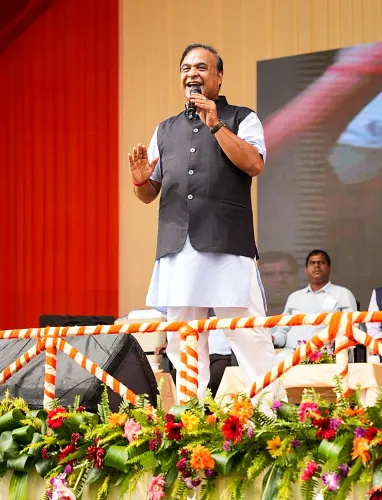Amit Malviya Responds to Rahul Gandhi's Dissent on CEC Appointment

Synopsis
Key Takeaways
- Amit Malviya counters Rahul Gandhi's dissent note.
- The dissent is labeled politically motivated.
- New appointment process governed by the 2023 Act.
- Appointment now involves a search committee and a selection panel.
- Concerns raised over the integrity of elections.
New Delhi, Feb 18 (NationPress) BJP IT Cell Chief Amit Malviya has responded to the Leader of Opposition (LoP) in Lok Sabha, Rahul Gandhi, regarding his dissent note concerning the appointment of the Chief Election Commissioner (CEC), labeling it as politically motivated and devoid of merit.
“This is an effort to undermine the constitutional authority of the elected government through malicious judicial activism. Furthermore, it inaccurately reads and misinterprets the Supreme Court’s ruling on the CEC’s appointment,” stated Malviya in a post on X on Tuesday.
Gandhi’s dissent note references a March 2023 decision from a five-judge Constitution Bench led by Justice K.M. Joseph, which modified the procedure for appointing members of the Election Commission of India (ECI).
In response to this ruling, Malviya contended, “To ascertain the original intent of the Constitution’s framers, the Court examined the 1949 Constituent Assembly Debates and remarked that the phrase ‘subject to the provisions of any law to be made by Parliament’ in Article 324(2) clearly allowed the appointment process to be at Parliament’s discretion.”
Prior to this ruling, the President was responsible for appointing the Chief Election Commissioner and Election Commissioners based solely on the Prime Minister’s advice. The appointment process is now regulated by the Chief Election Commissioner and Other Election Commissioners (Appointment, Conditions of Service, and Term of Office) Act, 2023, Malviya further explained.
Malviya detailed that under this Act, a search committee, headed by the Law Minister and comprising two senior bureaucrats, shortlists five candidates. This shortlist is then forwarded to a selection committee made up of the Prime Minister, the Leader of Opposition, and a Union Cabinet Minister (in this case, the Home Minister). The President makes the final appointment of the new CEC based on their recommendations.
“The Congress, particularly the Gandhis, should be the last to lecture on the appointment of the CEC, considering their history of misusing the office, appointing compliant candidates, and subsequently rewarding them with political positions after their tenure,” Malviya remarked.
Previously, Rahul Gandhi raised concerns about the urgency of the appointment, pointing out that the composition of the selection committee is currently undergoing judicial review.
“The Modi government has heightened apprehensions regarding the integrity of our electoral system by disregarding the Supreme Court’s directive and removing the Chief Justice of India from the selection panel,” he stated in a post on X on Tuesday.
Gandhi, who was present at the selection meeting, submitted a dissent note to Prime Minister Narendra Modi and Home Minister Amit Shah, asserting that an independent Election Commission relies on a transparent selection process, untainted by executive influence.
The Centre has appointed Gyanesh Kumar as the new Chief Election Commissioner (CEC) in a late-night decision. Kumar, a retired IAS officer from the Kerala cadre, takes over from Rajiv Kumar who has recently retired.










